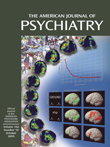To the Editor: In his article, Kenneth S. Kendler, M.D.
(1), identified “four major research paradigms,” consisting of 1) “basic genetic epidemiology,” 2) “advanced genetic epidemiology,” 3) “gene finding methods,” and 4) “molecular genetics.” Dr. Kendler argued that although “a substantial portion” of gene association claims “do not survive the test of replication,” family, twin, and adoption studies have found “genetic risk factors… for every psychiatric and drug use disorder that has ever been the subject of serious study” (p. 6). Moreover, “Unless there are strong and consistent methodologic biases operating across study designs, this growing body of work indicates that genetic risk factors are of substantial etiologic importance for all major psychiatric and drug use disorders” (p. 6).
However, as I argued in detail in my recent book
(2), family, twin, and adoption studies do indeed suffer from “strong and consistent methodologic biases operating across study designs,” not the least of which is the twin method’s questionable “equal-environment assumption.”
Dr. Kendler noted that the “low” replication level for linkage findings “contrasts strikingly with the high level of consistency seen in the results of genetic epidemiologic studies—for example, the results of family and twin studies of schizophrenia” (p. 7). In fact, there is no “striking contrast” between these results if they are viewed as evidence supporting a purely environmental etiology for psychiatric disorders. Environmental theories predict 1) familial clustering, 2) a higher concordance of identical versus fraternal twins, and 3) a failure to find genes, and this is what we find
(2,
3). Rather than consider a purely environmental explanation as a competing paradigm, Dr. Kendler argued that linkage and association studies cannot be used to test “whether a twin or adoption study was correct in its conclusion that disorder X is heritable” (p. 8). I agree, but negative results could at least compel researchers to take a second look at these methods. Although Dr. Kendler views his four strategies as “competing paradigms,” all four are components of the same biological/genetic paradigm, in contrast to what we might call the “environment/treatment/stress” paradigm.
Finally, Dr. Kendler called for integrating his four “paradigms,” which would “require an appreciation of the complementary sources of information obtained by genetic epidemiologic and gene identification approaches” (p. 9). Thus, a “striking contrast” was transformed into “complimentary sources of information” in the space of three pages. Dr. Kendler called his synthesis “explanatory pluralism” (p. 10), but what this means in practice is falling back on family, twin, and adoption results to explain the unexpected failure to find genes. Far better, in my view, would be a reexamination of the assumptions and biases of twin and adoption studies (Dr. Kendler’s paradigms 1 and 2) in the context of considering the possibility that genes for the major psychiatric disorders do not exist.

